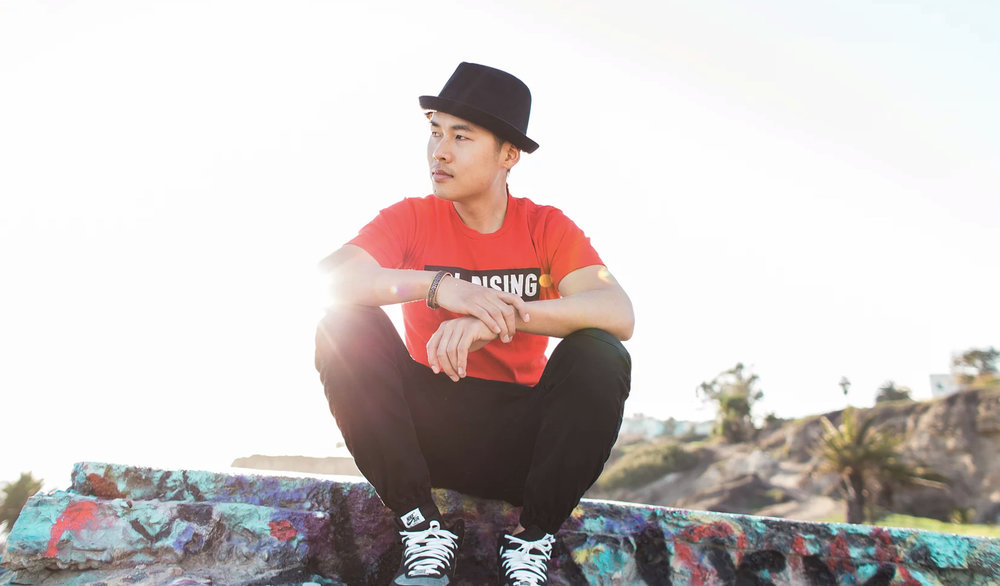
Growing up in a home where practicing transcendental meditation was the norm, Brandon Au has been on a spiritual — and musical — path from a young age. He says he started meditating at age four and discovered his passion for hip hop in his teenage years, when he taught himself to scratch DJ from video tapes he ordered from magazines. The tapes paid off — Au soon found himself placing as a finalist in DJ scratching competitions, eventually landing in second place at national DJ competition, DMC.
After branching away from music briefly to pursue a degree in accounting, Au found his way back, producing mellow electronic soundscapes under the moniker Sol Rising and touring all around the world playing yoga festivals like Wanderlust.
Following the release of his newest album, Soul Vibrations, we caught up with Au to talk about how he found his sound, the biggest thing he learned when releasing the album and what he does to get into a creative mindset.
Marmoset: Can you tell us how you got started in music?
Sol Rising: I was born in Vancouver, Canada and moved to Fairfield, Iowa, a small midwest town and the hub for transcendental meditation when I was 7 years old. I grew up in an interesting spiritual community and learned meditation, yoga and Sanskrit.
When I was 14 or 15, I became interested in hip hop and wanted to learn to DJ, so I saved up for some turntables. I started as a competitive DJ and worked my way up the ranks and ended up placing in a bunch of national competitions, like DMC.
I wasn’t into producing music at the time. I was just scratching and playing house parties. I went to university and decided there’s no way I could make a career doing music, so I studied accounting. After that, I didn’t really want to do accounting, so I went to India and went on a spiritual quest.
Then I realized the power of music to as a tool for transformation and decided to study music production at Pyramind in San Francisco. That’s where my music production journey began and I committed to making music a career.
You talked about getting your start in scratching and being more interested in hip hop. Now you have these really interesting and mellow soundscapes that you make. How did you get there?
I got into my current sound because of my involvement in the yoga festival scene. I travel internationally with Wanderlust and several other festivals and wanted to play my own original. My vision is to create music that is a hybrid between yoga music and mainstream electronic music.
Once I committed to catering to my yoga audience, I began having more success. I think it’s good to find a lane and stick to it so that people know your brand and what to expect.
What’s something you learned while working on Soul Vibrations?
One thing I’ve learned as a producer is that it’s ok to have influences and learn from your favorite artists. I began to make the most progress when I started to really listen and learn from people that are better than I am. I think everybody copies or is influenced by others. I like to think of it like practicing an instrument — learn what the pros do, build your chops, take all of your influences and combine them into something unique.
Is there a routine that you have to get you into a creative mindset?
I wouldn’t say I have a routine, but living a healthy lifestyle, getting enough rest, practicing yoga, drinking green smoothies etc. helps. Also listening to different kinds of music and going to shows can inspire me to create. Taking breaks is important to clear the mind and allow new ideas to come in.
What would you say is the hardest part about being a producer?
When making music starts to become a job, that can be difficult creatively, because I can start to rush or feel pressure to make music that will have success. So I start to create music for others rather than my own inspiration. It’s easy to follow trends and emulate music that’s having success but when you do that you are usually behind and not being yourself. As an artist I want to feel inspired and create regardless of whether I’m getting paid or not.
Jumping back to your career in scratching, what is one thing that people might not know about scratching?
A turntable can be used as a musical instrument. DJs can be legitimate musicians. I always get, “What do you do? Oh, you’re a DJ? Do you play any instruments?” I’m like, “Yeah. I play a turntable.” A turntablist is a musician.
What is the best piece of advice you’ve ever been given?
My stepdad used to always tell me, “See a good job. Do the job. Avoid the misery.”
